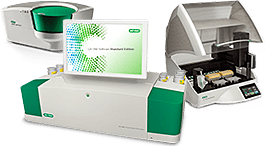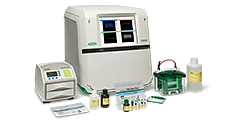Solutions for Successful Biosimilar Impurity Testing
In order to be able to demonstrate similarity to the reference originator biologic, researchers need to be able to quantify impurities that may affect its safety and efficacy. Explore our solutions for biosimilar impurity testing.

Biosimilar Impurity Quantification
Expression systems used to generate biosimilars contain many components that can compromise the safety and efficacy of a biopharmaceutical, even when present at low levels in the final product. Contaminants such as host cell proteins (HCPs) and host cell DNA (hcDNA) can be reduced to safe levels by employing a robust purification strategy. To meet regulatory requirements, drug manufacturers employ sensitive and reliable detection methods.
Antibodies are the most commonly used tool for detecting and assessing HCPs due to their identification, detection, and quantification capabilities. Evaluation and validation of anti-HCP antibodies are streamlined by Bio-Rad’s HCP validation workflow, which provides fast, precise, and cost-effective evaluation of antibodies. Highly sensitive, reliable detection on western blots and subsequent analysis are provided in a workflow that takes less than two days.
Quantifying residual hcDNA by Droplet Digital PCR (ddPCR) provides the most sensitive absolute quantification. Traditionally, qPCR has been used for hcDNA quantification, but this technique can be susceptible to PCR inhibitors found in complex matrices, such as biological material, and thus often requires a DNA extraction step. Bio-Rad’s ddPCR technology eliminates the need for DNA extraction and allows direct quantification of residual DNA from multiple species without compromising accuracy, sensitivity, or precision.
Companion Products for Biosimilar Impurity Testing

Droplet Digital PCR (ddPCR) Systems, Primers, Assays, and Arrays
- Detection of residual host cell DNA without the need of DNA extraction
- Lower limit of detection than qPCR

Host Cell Protein Workflow
- 2D electrophoresis gels and tanks with sensitive stains
- Rapid transfer systems
- Easy-to-use sensitive imagers
- Analysis software with automated spot detection and matching S3e Cell Sorter
